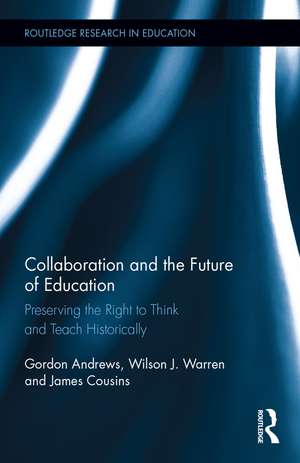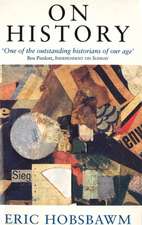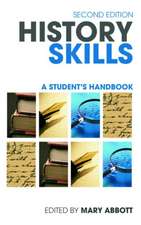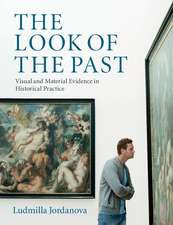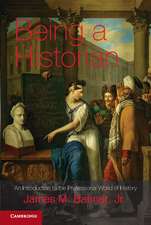Collaboration and the Future of Education: Preserving the Right to Think and Teach Historically: Routledge Research in Education
Autor Gordon Andrews, Wilson J. Warren, James Cousinsen Limba Engleză Hardback – 2 noi 2015
This volume provides systematic models and examples of ways that history teachers can compete with and effectively halt this transformation. The alternatives the authors present are based on collaborative models that address the art of teaching for pre-service and practicing secondary history teachers as well as collegiate history educators. Relying on original research, and a maturing body of secondary literature on historical thinking, this book illuminates how collaboration can create real historical learning.
| Toate formatele și edițiile | Preț | Express |
|---|---|---|
| Paperback (1) | 389.38 lei 6-8 săpt. | |
| Taylor & Francis – 18 mai 2017 | 389.38 lei 6-8 săpt. | |
| Hardback (1) | 1160.51 lei 6-8 săpt. | |
| Taylor & Francis – 2 noi 2015 | 1160.51 lei 6-8 săpt. |
Din seria Routledge Research in Education
-
 Preț: 310.29 lei
Preț: 310.29 lei -
 Preț: 304.19 lei
Preț: 304.19 lei -
 Preț: 303.18 lei
Preț: 303.18 lei -
 Preț: 147.15 lei
Preț: 147.15 lei -
 Preț: 303.89 lei
Preț: 303.89 lei -
 Preț: 302.17 lei
Preț: 302.17 lei -
 Preț: 303.75 lei
Preț: 303.75 lei -
 Preț: 290.73 lei
Preț: 290.73 lei - 8%
 Preț: 381.60 lei
Preț: 381.60 lei - 9%
 Preț: 867.43 lei
Preț: 867.43 lei -
 Preț: 304.83 lei
Preț: 304.83 lei -
 Preț: 377.85 lei
Preț: 377.85 lei -
 Preț: 401.01 lei
Preț: 401.01 lei -
 Preț: 310.65 lei
Preț: 310.65 lei -
 Preț: 364.04 lei
Preț: 364.04 lei -
 Preț: 129.83 lei
Preț: 129.83 lei -
 Preț: 310.08 lei
Preț: 310.08 lei -
 Preț: 310.22 lei
Preț: 310.22 lei -
 Preț: 310.31 lei
Preț: 310.31 lei - 8%
 Preț: 381.99 lei
Preț: 381.99 lei -
 Preț: 276.13 lei
Preț: 276.13 lei - 9%
 Preț: 935.36 lei
Preț: 935.36 lei -
 Preț: 303.89 lei
Preț: 303.89 lei -
 Preț: 358.67 lei
Preț: 358.67 lei -
 Preț: 400.72 lei
Preț: 400.72 lei - 18%
 Preț: 1060.52 lei
Preț: 1060.52 lei - 18%
 Preț: 1116.74 lei
Preț: 1116.74 lei -
 Preț: 397.75 lei
Preț: 397.75 lei - 18%
 Preț: 1221.80 lei
Preț: 1221.80 lei - 18%
 Preț: 1110.74 lei
Preț: 1110.74 lei - 18%
 Preț: 1053.92 lei
Preț: 1053.92 lei - 18%
 Preț: 1162.84 lei
Preț: 1162.84 lei - 18%
 Preț: 1063.65 lei
Preț: 1063.65 lei - 28%
 Preț: 851.82 lei
Preț: 851.82 lei - 18%
 Preț: 1054.75 lei
Preț: 1054.75 lei - 18%
 Preț: 1054.58 lei
Preț: 1054.58 lei - 18%
 Preț: 1178.85 lei
Preț: 1178.85 lei - 18%
 Preț: 1111.72 lei
Preț: 1111.72 lei - 18%
 Preț: 1057.75 lei
Preț: 1057.75 lei -
 Preț: 489.03 lei
Preț: 489.03 lei - 18%
 Preț: 1059.14 lei
Preț: 1059.14 lei - 18%
 Preț: 1050.09 lei
Preț: 1050.09 lei - 18%
 Preț: 1060.52 lei
Preț: 1060.52 lei - 18%
 Preț: 1062.98 lei
Preț: 1062.98 lei - 18%
 Preț: 1056.28 lei
Preț: 1056.28 lei - 18%
 Preț: 1217.63 lei
Preț: 1217.63 lei - 18%
 Preț: 1060.19 lei
Preț: 1060.19 lei - 18%
 Preț: 1170.84 lei
Preț: 1170.84 lei - 18%
 Preț: 1167.36 lei
Preț: 1167.36 lei
Preț: 1160.51 lei
Preț vechi: 1415.25 lei
-18% Nou
Puncte Express: 1741
Preț estimativ în valută:
222.05€ • 231.87$ • 183.37£
222.05€ • 231.87$ • 183.37£
Carte tipărită la comandă
Livrare economică 15-29 aprilie
Preluare comenzi: 021 569.72.76
Specificații
ISBN-13: 9780415734394
ISBN-10: 0415734398
Pagini: 142
Dimensiuni: 152 x 229 x 10 mm
Greutate: 0.36 kg
Ediția:1
Editura: Taylor & Francis
Colecția Routledge
Seria Routledge Research in Education
Locul publicării:Oxford, United Kingdom
ISBN-10: 0415734398
Pagini: 142
Dimensiuni: 152 x 229 x 10 mm
Greutate: 0.36 kg
Ediția:1
Editura: Taylor & Francis
Colecția Routledge
Seria Routledge Research in Education
Locul publicării:Oxford, United Kingdom
Public țintă
Postgraduate and UndergraduateCuprins
1. Introduction. Part I: The Current Landscape of History Education. 2. History Alive! is History Dead: Problems with Textbook-driven Instruction. 3. The Teaching American History Project: Teachers’ Assessments of Its Classroom Connection. 4. Crossing the Educational Rubicon: Collaboration as a Model for Change. Part II: The Argument for Creating the Space to Think and Teach Historically. 5. Developing a Craft Approach to Teaching History: What We Can Learn from the Gilder Lehrman Institute of American History’s National History Teachers of the Year. 6. A Collaborative Model for Assessing Teachers: Why We Need It. Part III: Collaborating to Create Authentic Historical Thinking and Learning. 7. Historiography in High School Classrooms: A Review of the Literature. 8. Lifting the Veil: Teachers and Historiography. 9. Students and Historiography: How Collaboration Improves Learning. 10. Collaboration and Pre-Service Teachers: Using Historiography as Pedagogy. 11. Alternative Education: Historiography and Historical Thinking in the Non-Traditional Classroom
Notă biografică
Gordon P. Andrews is Associate Professor of History at Grand Valley State University, USA.
Wilson J. Warren is Professor of History at Western Michigan University, USA.
James P. Cousins is Director of Undergraduate Studies and Master Faculty Specialist at Western Michigan University, USA.
Wilson J. Warren is Professor of History at Western Michigan University, USA.
James P. Cousins is Director of Undergraduate Studies and Master Faculty Specialist at Western Michigan University, USA.
Descriere
Current educational reforms have given rise to various types of "educational Taylorism", which encourage the creation of efficiency models in pursuit of a unified way to teach. In history education curriculum, this has been introduced through scripted textbook-based programs such as Teacher Curriculum Institute’s History Alive! and completely online curricula. This volume will provide systematic models and examples of ways that teachers can compete with and effectively halt this transformation, and bring the craft of teaching back into the classroom.
